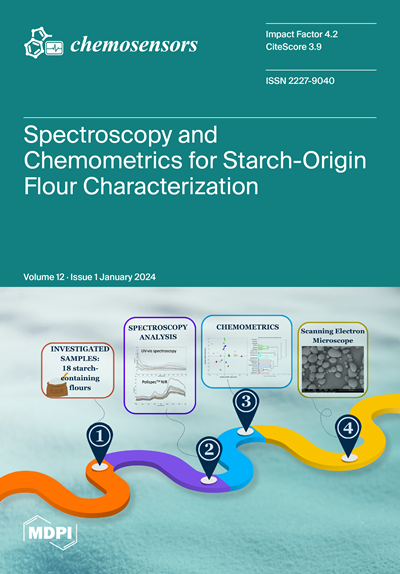用 PEDOT:以 PEDOT: PSS/MWCNTs-COOH 纳米复合材料为改良工作电极材料检测 Tau-441 的电化学免疫传感器
IF 3.7
3区 工程技术
Q2 CHEMISTRY, ANALYTICAL
引用次数: 0
摘要
Tau-441蛋白磷酸化损伤与阿尔茨海默病(AD)的进展呈正相关,是最有可能早期发现AD的标志物。人血清中Tau-441含量低是实现其含量检测的主要困难。本文基于电化学免疫分析技术,制备了以聚(3,4-乙烯-二氧噻吩)-聚苯乙烯磺酸盐(PEDOT: PSS)/羧化多壁碳纳米管(MWCNTs-COOH)纳米复合材料修饰的电化学免疫传感器,用于低浓度检测Tau-441。基于纳米复合材料的免疫传感器可以利用导电聚合物的特性实现电信号放大,并利用MWCNTs-COOH增加活性位点的接触面积,与电极上的Tau-441抗体结合。通过原位表征技术和电化学表征方法研究了PEDOT: PSS/MWCNTs-COOH的物理化学和电学性质,表明该免疫传感器对Tau-441免疫反应具有较高的选择性和敏感性。在优化后的最优条件下,电化学免疫传感器对一定浓度范围内的Tau-441进行检测,获得了较低的检出限(0.0074 ng mL−1),并通过实际人血清样品检测实验证明了良好的检测性能。因此,本研究为AD的早期诊断提供了有效的参考价值。本文章由计算机程序翻译,如有差异,请以英文原文为准。
An Electrochemical Immunosensor with PEDOT: PSS/MWCNTs-COOH Nanocomposites as a Modified Working Electrode Material for Detecting Tau-441
The progression of Alzheimer’s disease (AD) is positively correlated with the phosphorylation damage of Tau-441 protein, which is the marker with the most potential for the early detection of AD. The low content of Tau-441 in human serum is a major difficulty for the realization of content detection. Herein, we prepared an electrochemical immunosensor modified with Poly(3,4-ethylene-dioxythiophene)-poly (styrene sulfonate) (PEDOT: PSS)/Carboxylated multi-walled carbon nanotube (MWCNTs-COOH) nanocomposites based on electrochemical immunoassay technology for the low-concentration detection of Tau-441. The immunosensor based on the nanocomposite can take advantage of the characteristics of conductive polymers to achieve electrical signal amplification and use MWCNTs-COOH to increase the contact area of the active site and bond with the Tau-441 antibodies on the electrode. The physicochemical and electrical properties of PEDOT: PSS/MWCNTs-COOH were studied by in situ characterization techniques and electrochemical characterization methods, indicating that the immunosensor has high selectivity and sensitivity to the Tau-441 immune reaction. Under optimized optimal conditions, the electrochemical immunosensor detected a range of concentrations of Tau-441 to obtain a low detection of limit (0.0074 ng mL−1) and demonstrated good detection performance through actual human serum sample testing experiments. Therefore, the study provides an effective reference value for the early diagnosis of AD.
求助全文
通过发布文献求助,成功后即可免费获取论文全文。
去求助
来源期刊

Chemosensors
Chemistry-Analytical Chemistry
CiteScore
5.00
自引率
9.50%
发文量
450
审稿时长
11 weeks
期刊介绍:
Chemosensors (ISSN 2227-9040; CODEN: CHEMO9) is an international, scientific, open access journal on the science and technology of chemical sensors published quarterly online by MDPI.The journal is indexed in Scopus, SCIE (Web of Science), CAPlus / SciFinder, Inspec, Engineering Village and other databases.
 求助内容:
求助内容: 应助结果提醒方式:
应助结果提醒方式:


